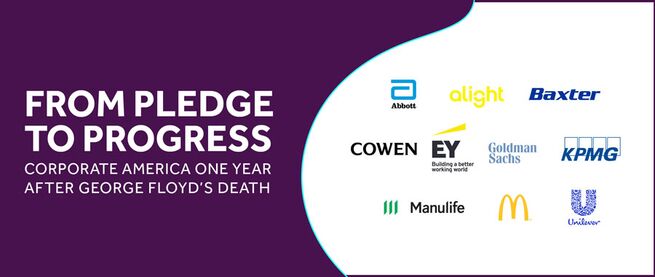After the killing of George Floyd in May 2020, many leaders across corporate America spoke up and out against systemic racism. They issued statements, lent financial power to anti-racism causes, and made DEI a priority within the walls of their organizations. It has been a year since George Floyd’s death and we at Seramount wanted to know just how far corporate America has come (and how far it still needs to go) as it relates to addressing racism in the workplace.
In April 2021, Seramount conducted a national survey of 2,431 college-educated professionals at companies with at least 5,000 US employees about their perceptions of racism in the workplace and their organization’s support for anti-racism efforts.
Here, we go behind the scenes with two members of Seramount’s Insights team about its latest research, From Pledge to Progress: Corporate America One Year After George Floyd’s Death.
Tell us a bit about your role in the research and about your job at Seramount?
Michele Siegel, Senior Director, Insights & Co-Lead Insights Department: Our role on the Insights team has been to manage and guide this research process end-to-end. At the start, that included examining our proprietary database of employee experience insights over the past year and meeting with our cross-functional teams to listen to what they have been hearing from their clients and partners. As a team, we aligned on the study’s objectives and key areas of measurement to test in the research and developed our methodology around that—our sample parameters (who we wanted to collect insights from) and combining both a qualitative and quantitative approach. As we began to develop the survey questionnaire, we held brainstorming sessions to hear multiple perspectives both internally and through our advisory board. Next, we moved to implementation which included programming and testing, and then finally, launching the survey. Then, the analysis began.
As Senior Director of Insights, I translate questions and hypotheses into structured quantitative and qualitative research plans to execute timely market insights and national reports. I work closely with our consulting team to develop and implement innovative data gathering and listening methodology in order to map workplace cultures that provide tailored, measurable and actionable recommendations to our clients.
Paule Anne Kaziewicz, Director, Insights: Like Michele, I am responsible for creating research plans for national reports based on the questions and areas of interest for our colleagues at Seramount. Additionally, I work with clients through our consulting division to field more intimate research to their employee bases and from there, help them to better understand their workplace cultures and provide recommendations when needed.
How did the idea for this research topic come about?
Paule Anne Kaziewicz: After the death of George Floyd, companies and their leaders were making public commitments to combating racism and creating change in their workplaces. But through a series of anonymous focus groups that Seramount (formerly WMM) conducted examining employee experiences with inclusion and development strategies in late 2020, we saw a huge divide between what companies were pledging to do in this area (after the death of George Floyd) and what they were actually doing as perceived by the employees. We decided to go straight to employees across the country to learn what they saw being done (and not done) at their organizations a year later after having made those commitments.
Michele Siegel: We also wanted to understand employees’ sentiment and perception on what they believe is the role of the organization, senior leadership, direct managers, and their own personal commitment when it came to DEI. Another important area of measurement was to understand how the experiences for employees across racial/ethnic and gender differs as it pertains to where their organization is on the journey to progress, their experiences of bias and discrimination within the company, and their perceptions of inclusiveness and, ultimately, accountability, of their senior leaders and managers. And then, ultimately, how does this all impact employee loyalty, retention, and engagement at their company.
What was the one thing that surprised each of you the most when going through the findings?
Paule Anne Kaziewicz I don’t think I was very surprised at any of the findings but instead was made more aware of what still needs to be done. It’s easy to make pledges but acting on them takes time and effort. Once we’ve made those pledges to do and be better, we need to regularly step back and assess the progress we’ve made and from there, adjust what we’re doing to meet those goals.
Michele Siegel: The vast majority of employees (83 percent) say they are committed to helping their companies fight racism and injustice within their organization. However, those employees have had a variety of different experiences within their organizations—such as thirty-five percent of Black men and 15 percent of Black women fear for their personal safety inside the workplace since May 2020 because of race-based violence or discrimination; only twenty percent of Black employees say their managers foster psychological safety; and that Black employees see more bias in recruitment, retention and advancement processes compared to their Asian, Hispanic and White colleagues.
Looking back, are there any questions that you wish you included in the survey but didn’t?
Michele Siegel: For our future research, I would like to dig deeper into what employees need in order to support their organization in their work towards fighting racism and injustice, as well as what other factors are driving, or not, employee engagement in this effort.
If organizations could take away one lesson from this research, what should it be?
Michele Siegel: Measurement of the employee experience at all levels of the organization and capturing their voice on a consistent basis is critical to understanding the impact progress (or lack of) is having in order to drive a path forward.




